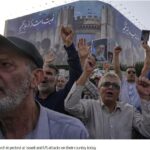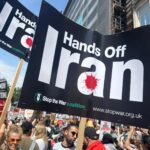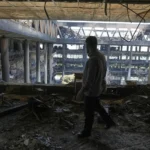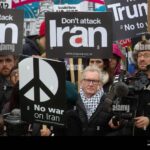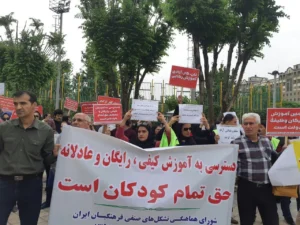
CODIR has received verified reports and information from inside Iran that May Day and events to mark International Workers’ Day have yet again served as the precursor to the arrest of scores of labour activists and a wider clampdown by the Islamic Republic authorities.
Since Thursday 1 May, Tehran Metro worker activists Hadi Khoshbakht, Aghil Nasrallahi, and Hashem Golafshan; esteemed teachers and educators Ahmad Heidari, Mirza Seyedi, Sadeghi, Reza Moslemi, Mehdi Farahi Shandiz; as well as Younes Azadbar, a retired activist and former political prisoner living in the city of Sangar, Gilan province, have been arrested at their homes.
Further to this list, Mehdi Tavakoli, a project worker and activist in the oil and gas sector has been issued a summons to serve an eight-year prison sentence accompanied by flogging on account of his activities. Prominent labour activist Hamid Sharghi has also received a summons from the authorities to serve a one-year prison sentence. Both are members of the Union of Metalworkers and Mechanics of Iran (UMMI).
Meanwhile, Ebrahim Madadi and Davoud Razavi, both employees and trade union activists of the Syndicate of Workers of Tehran and Suburbs Bus Company (SWTSBC) – referred to widely as Syndica-e Sherkat-e Vahed – and Esmail Gerami, a retiree activist from Tehran, are already in languishing in the regime’s prisons.
The only ‘crime’ of the aforementioned courageous activists is their taking a stand against corruption and mafia entrenchment within the government and the industries in which they work, and the deeply unjust anti-people policies and terrible conditions that stem from this.
Mr. Azadbar is a prominent figure among independent retirees in Iran’s northern Gilan province who now faces another term of imprisonment. IRGC intelligence agents violently burst into his home in Sangar on Monday 5 May and took him away without even producing the necessary judicial warrant. The 62-year-old pensioner suffers from several serious health conditions, including severe epilepsy, all of which have been exacerbated owing to the maltreatment he received during his previous term of imprisonment and the poor conditions he endured. He relies on a cardiac pacemaker and requires constant medical attention. Consequently, there are grave concerns for the safety and welfare of Mr. Azadbar amid warnings that his life is in danger.
This terrible situation continues in Iran despite the fact that the country’s Constitution makes clear that demanding labour rights and peaceful protests pursuant to such are the rights of all Iranian citizens and cannot be curtailed or circumvented, whether for political expediency or any other reason.
These legitimate protests by Iran’s workers and retirees who, in the name of the progressive development of their country as well as for an improvement in their livelihoods and working conditions, stand against the continual degradation imposed under Islamic Republic rule, is not only sanctified by law but is a human right.

“Despite the large-scale observing and indeed celebration in Iran of May Day, International Workers’ Day, in the years immediately after the 1979 Revolution – including by pro-government currents – these days I would not rate the chances of any such celebration by a government affiliated or quasi-independent setup, let alone it being held freely,” remarked Maziyar Gilaninejad, a longtime activist, representative, and spokesperson for the UMMI.
“Public events to mark 1 May in Iran are absolutely restricted by the government and any organisation or individual who attempts to hold such an event or gathering would undoubtedly face consequences from the state security agencies… Alas, this has been so for just over 40 years now,” Mr. Gilaninejad continued:
“No labour union has the right to operate freely, and public events or drives for recruitment to membership will often lead to dismissal by the employer, and even arrest and imprisonment by the authorities thereafter.
“However, at times, under critical pressure from disgruntled workforces, employers have been forced to accept worker representatives for negotiations regarding pay and conditions – as in the cases of the disputes at Ahvaz Steel, Haft Tappeh, the Bandar Deylam Gas Station, as well as of the project workers at the Ministry of Oil, where I myself attended as a representative.
Though it should be noted this does not remotely approach any notion of collective bargaining. And amid all this, it is worth remembering that the minimum wage package plus benefits for a married worker with two children in Iran amounts to just 16.34 million tomans a year [approximately £166 depending on the exchange rate in effect, which is constantly fluctuating].”
The above reports, received directly from Iranian trade union and worker activists, clearly indicate that fierce repression against any labour-oriented action or campaign, however legitimate and peaceful, remains the status quo in Iran today.

CODIR calls upon its affiliates and supporters in the trade union movement to demonstrate their consistent and principled solidarity with the workers and wage earners in Iran struggling for justice and their legitimate rights – including for safe workplaces and a fair living wage – in line with all ILO conventions and international protocols regarding workers’ rights. Indeed, it is a damning indictment of the state of affairs in the Islamic Republic of Iran that it remains a core demand for the authorities there to respect the freedom to establish, assemble, and operate a trade union as well as for workers to be able to partake unimpeded in the activity of such organisations.
The consistent expression of solidarity with struggling Iranian workers and trade unionists is of crucial importance in the wider struggle for human and democratic rights and social justice currently taking place in Iran and in making sure that their legitimate and righteous demands remain at the fore and not wantonly dismissed or circumvented by the Islamic Republic authorities.
Central office
CODIR







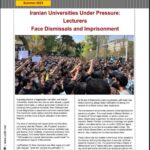





 Posted in
Posted in 
